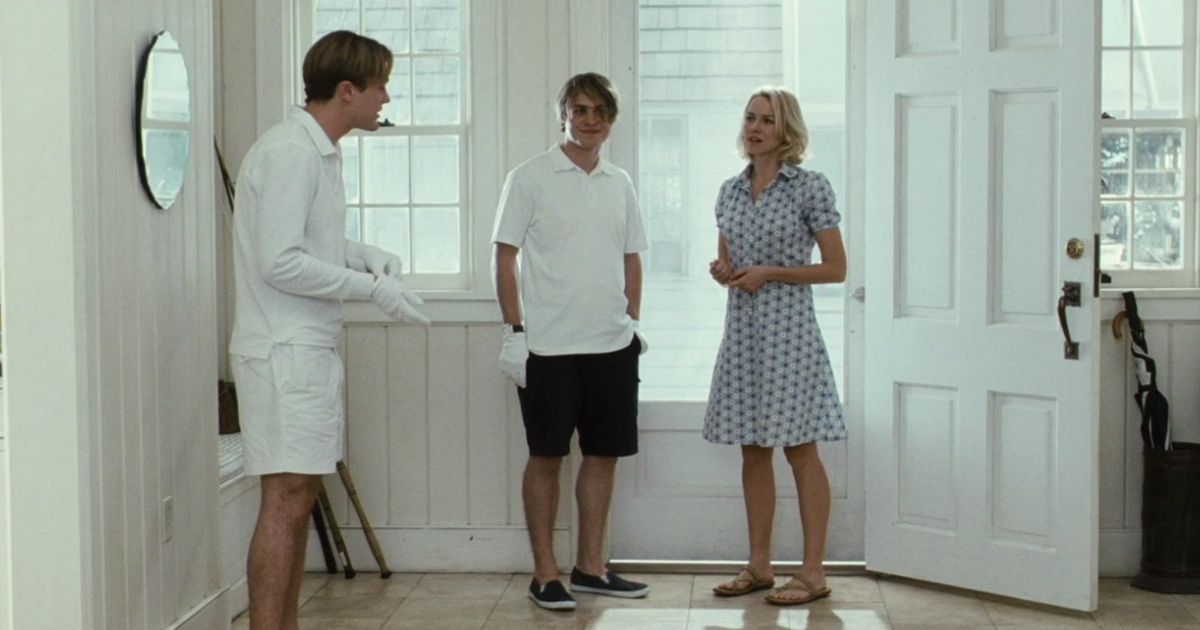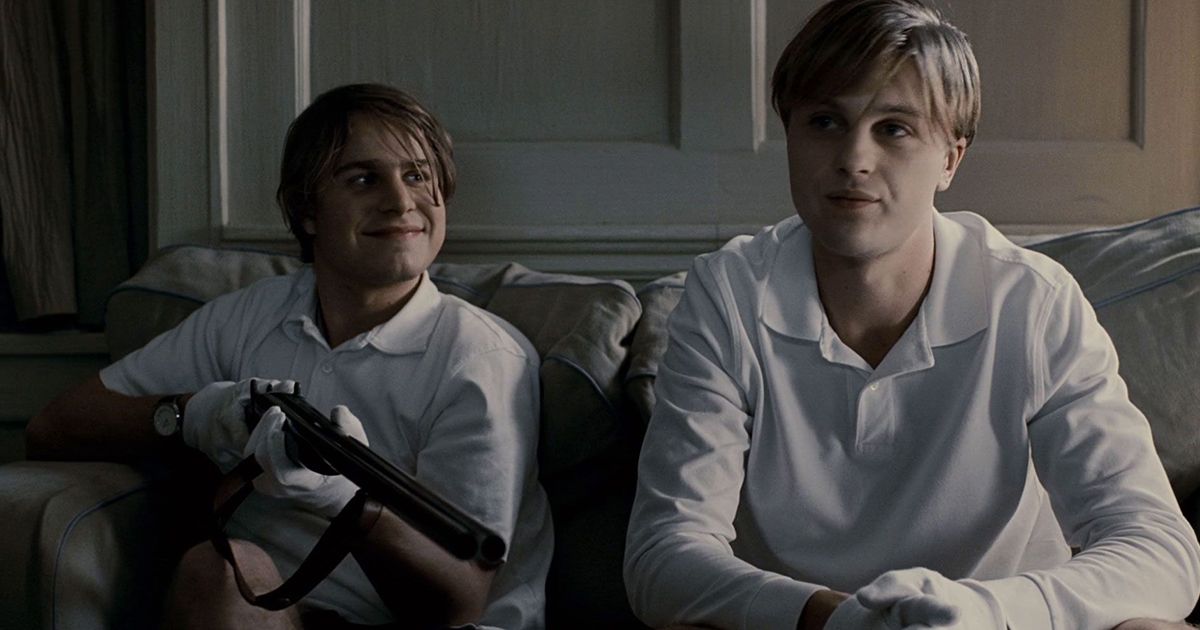The controversial film Funny Games came to American screens in 2007 and left audiences shocked and saddened. A film that truly played with the hearts and minds of its audience, Funny Games has received mixed reviews. While critics from publications like IGN hailed the film as an "unrelenting and brilliant" project, other sites billed the film as "art-house torture porn" and worse than the likes of Saw.
Michael Haneke's 2007 film was a shot-for-shot remake of Haneke's own German-language movie from a decade earlier, and follows an American family who, unbeknownst to them, finds themselves on a vacation from hell. Ann, George, their son Georgie and dog Lucky are the typical nuclear family simply hoping to enjoy a getaway at their lake house. They soon come across two young men, Peter and Paul, who seemingly radiate a relaxed positivity and a sheen of politeness. They simply ask for eggs, a question that would not seem strange to the average American. Little do they know, an innocent request for eggs would result in a rather traumatic experience for the Farber family onscreen and the viewers in the audience.
A Story of Loss
The film's bitter conclusion has scarred a lot of viewers. There's a lingering suspicion that something is not right, however the reality of the situation proves to be far more horrifying. Peter and Paul are revealed to be a maniacal, murderous duo who slowly but surely take out each family member one by one. Unlike most villains, Paul and Peter do not remain in the confines of the cameras so to speak. They routinely break the fourth wall and interrogate the audience, acting as a mouthpiece for Haneke himself. There is even a scene when the pair manipulates the sequence of events.
What makes the film all the more saddening is how senseless the violence seems. Despite the methodical nature of the murders, Peter and Paul do not seem to have a motive for carrying out the killings. In turn, the deaths in the films are all the more tragic and the actors do not fail to capture raw grief in their portrayals as the film continues.
What would motivate Paul and Peter to carry out such senseless attacks? According to Haneke, the blame rests largely on the shoulders of the audience.
The Anti-Violent, Violent Film
Haneke, the director of Funny Games and some of the hardest-to-watch films of recent decades, explained his ambitions to critique the very violent depictions in media seen in Funny Games. The director has been on the receiving end of criticism that questions his use of violence in the film. Many films have attempted to address permeating violence. Movies such as Fight Club rely on its source material to contribute to existing discussions about the significance violence holds in conversations of mental health, masculinity, and even fascism.
Other films, such as American Psycho and Nightcrawler, play with similar themes of consumerism, masculinity, and violence with each birthing multiple sub-communities of fans with varying opinions and beliefs. However, Michael Haneke takes a step back. With Funny Games, he not only hints at the various dynamics at play such as masculinity and class but ultimately comes to a conclusion regarding society as a whole and its thirst for violence.
The Exact Remake of Funny Games Is More Than Worth Watching
When asked why he chose to critique violence with an excessively violent film, Haneke states that he had to shake the audience up a bit for them to truly understand the danger of pervasive violence in media has become. Additionally, he claims that the media landscape regarding violence has not changed significantly, and thus, his American iteration of the original Austrian film managed to leave the country and the Anglosphere at large both shocked, dismayed, and disgusted. Funny Games was always meant to be for Americans, in a way; it's mostly their culture it's critiquing.
The Anglicization of Haneke's Austrian offering also highlights another criticism he has for his English-speaking viewers. Xenophobia in the United States is largely discussed at the surface level, if discussed at all. The idea of not watching a film or understanding the prevalent messages of the film due to an imaginary language barrier, while having subtitles available, might seem like a small "preference." Nonetheless, it speaks to a larger sense of entitlement enabled by American exceptionalism, refuting significant commentary on society by simply defining art by its foreignness.
The Execution and Impact of Funny Games
Despite the mixed reviews, Haneke creates an immersive and intriguing experience in Funny Games. At the center of the film, Haneke discusses the obsession with violence that comes with modern-day media consumption. In this particular context, the term obsession includes far more than positive emotions such as aspiration or even idolization. The obsession that Haneke criticizes encompasses emotions such as sensationalism and virtue signaling.
Many audiences would agree that the actions depicted in the film are abhorrent. However, Haneke captures the violent acts realistically in the film without depicting them as "awesome" or aspirational, unlike other films. The only aspect of the film that seems extraordinary is Peter and Paul's blatant manipulation of the narrative. However, that action only corroborates Haneke's existing ethos rather than an act of glamorization. The film in general depicts Peter and Paul's reign of terror as the ruthless and vile act that it is.
Peter and Paul, while serving as the antagonists, are also portrayed as god-like. Frequently breaking the fourth wall not only offers the pair an advantage and audiences a jarring viewing experience but characterizes the killers as gods. They can do the unthinkable to complete their missions, sacrificing the characters to an audience with insatiable bloodlust whether they would like to admit it or otherwise. Their actions give the audience the chance to jump in horror, stare in intrigue or simply enjoy the violence displayed on the screen.
With Haneke's intent for the film embedded into the script and the cinematography, the film itself does not justify the reactions. Instead, the film interrogates our desensitized minds, a result of decades worth spent sensationalizing brutal incidents of all kinds on the television screen, the silver screen, and the phone screen.
Over 15 years since its initial release, Funny Games remains relevant as a thought-provoking commentary on how violence is treated as a commodity. Currently, there are endless podcasts, series, books, and social media platforms dedicated to sensationalizing various murders, traumatic assaults, and international incidents that prioritize the large consumer base rather than the victims and survivors at the center of the film. While no form of media is inherently flawless, Michael Haneke creates a violent film, not for entertainment but rather to critique the concept of reframing violence as just another form of entertainment.


.jpg)



